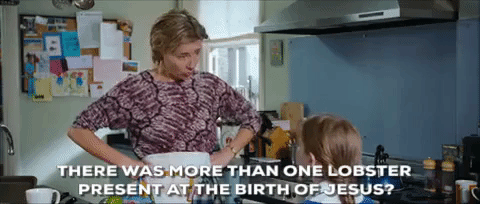
Christmas 2018: Economy Roundup
Happy Holidays Economy readers!
Whether you’re celebrating Christmas this year or not, hopefully this round up of stories and stats will give you and your family/friends something good to argue about over dinner.
(Need some inspo to get you started? How about whether Christmas is good or bad for the economy? Or, if you really want to spend the day furious and not speaking to each other, how about whether Die Hard is a Christmas film or not.)
Merry Dump-mas!
Ghosting your Tinder beau is so Halloween. This season, it’s all about Scrooging - aka dumping your S.O. cos the alternative is spending some of your hard-earned moolah on a Christmas prezzie for them. Appaz ten percent of people admit to having ‘Scrooged’, and a not-super official-sounding survey looked at a bunch of Facebook statuses and concluded that more people get dumped on December 11th than any other day of the year. Tbf, Xmas presents aren’t cheap - the Bank of England reckons each UK household spends about £500 on them each year.

Signed, sealed, thrown in a bush…
Ordered some prezzies online this year? You’ve got about a 50/50 chance of getting it delivered properly, according to a survey by Which?. As the parcels pile up, busy delivery drivers leave packages unattended outside doors, in bins and bushes, or just forget to deliver them at all. But don’t be too harsh on them - according to one delivery driver they’re all spending the run up to Christmas working 18-hour days without breaks. Doesn’t sound super fun, that.
Is Christianity being stamped out?
For Christmas, the UK’s Royal Mail makes two special sets of stamps: one with a Christian theme, and one which is festive but not religious. But Jesus stamps are fast falling out of fashion - they’re chosen for just 40 percent of purchases (still, not bad going, Jesus), down from 60 percent five years ago. An obvious reason would be that Brits are becoming less religious: 52 percent now say they have no faith. (Side note: that might have interesting effects on the economy, as some people think religious values change how we think about things like work ethic, money and equality). But Christian spokesperson Tim Dieppe has a different suggestion: “the artists for secular stamps are better”. Ouch.

Dreaming of a green Christmas…
Environmentalists are asking people to be a bit more mindful of how much crap they throw away each Christmas. While modern techniques and technologies lets our economy create stuff for super affordable (and therefore accessible-to-everyone) prices, it also means more waste: each December, 100 million bin-bags-worth of toy packaging is chucked. And that’s before we even get started on the third of gifts that are never actually used. There are easy-ish ways we could all be more planet-friendly at Christmas, such as recycling wrapping paper, badgering toy-makers to encase their products in less layers of plastic, and getting together a hit squad to hunt down that store that all our elderly relatives buy us those hideous jumpers/socks/hats from.
So much for the Christmas spirit
The Britannia Royal Hotel, in Hull, is looking like a bit of a dick after it cancelled a booking made by a charity which would have given 28 homeless people somewhere to stay over Christmas. It was apparently worried they’d make a mess. The charity organiser said the hotel knew well in advance who the booking was for. Luckily, The DoubleTree Hilton has stepped forward to offer up some of their rooms, plus a Christmas dinner. But should it be up to charities/businesses to end homelessness? Or does the government need to do more?
We also want to take a moment to acknowledge everyone here in the UK and around the world who is in a bad or vulnerable situation this Christmas. One million Brits, particularly those who are old, unwell or homeless, will spend the day alone. But there are people and charities trying to change that. If you’d like to help out, check out Crisis’ webpage, where you'll find donating and volunteering opportunities.

Brexit Box
What’s likely to happen with Brexit over Christmas? Well, with just 101 days till Brexit Day, a Liberal Democrat MP has said Christmas should be cancelled for MPs until they decide what they’re going to do about it. But nobody seems to want to listen to him (funny that) meaning Parliament will go on holiday from the 20th December to the 7th January.
Meanwhile, the government says it’s going to spend the time before Christmas doing lots of planning for a no-deal Brexit. (So stay tuned for some Brexiteers interrupting your binge-watching of Elf to tell us how a no-deal Brexit means we can have our Christmas pudding and eat it too.)
Opposition leader Jeremy Corbyn has said Parliament should vote (again) on whether it has any confidence in Prime Minister Theresa May. He’s hoping that a General Election will be called if MPs say they don’t. If Labour wins that, they want to go back to the EU and negotiate a new deal… which they EU says it won’t do. Jolly good all round then.

Q: Why did the economist dislike their Christmas present?
A: They believe non-cash gifts are inefficient (i.e. not a good use of resources) because a gift-giver cannot have perfect information (be psychic, basically) about which gift would maximise the recipient's utility (give them the most pleasure).
Sound extreme? Poss, but it’s what we’d all end up doing if we followed this (popular) economic theory exactly: we’d all agree that presents are dumb and we should just give each other money so we could all get things we actually wanted and would use, so there would be less undesired present gathering dust on a shelf somewhere.
So why don’t we? Well, some economists say it’s because Christmas presents have positive externalities (spillover effects from every transaction) like the receiver being chuffed that the giver thought of them, and the giver being chuffed that they got to make someone else happy.

What’s that? You’d like some Christmassy economic-y facts to impress your mates with down the pub / in-laws that have muscled their way into Christmas lunch? Well, since you insist…
️ Boxing Day gets its name from a tradition of filling small boxes with money and giving them to the poor. But according to a survey by Google, 40 percent of Brits no longer give any money to charity over Christmas. Most people who do donate give up to £50.
The pressure to put on a ‘perfect Christmas’ can leave Brits struggling financially by the New Year, according to debt advice charities. Last year, almost 8 million Brits (16 percent of the population) said they would end up in debt because of Christmas spending. Part of the problem may be that it’s too easy to have access to credit which you then can’t afford repay - 37 of people put Christmas presents on credit cards.
️ There’s good money in spreading the holiday cheer. White Christmas by Bing Crosby, aka is the bestselling Christmas song ever, makes Bing a cool £328,000 in royalties every year. Home Alone, the Christmas movie that made the most at the box office, raked in $285.76 million. (Tbf, this was 1990 BN, Before Netflix).
Because so many people crank up the shopping, drinking and socialising in December, lots of businesses hire a bunch of seasonal staff. That can be good news for job seekers, who have more options. And if lots of businesses are desperate for staff and the unemployment rate is low, they may compete by putting up wages.
️ Just 3 percent of British employees work on Christmas Day. But did you know that our collective skive-off work might make the economy smaller? Some research shows that everytime we have a bank holiday we forfeit £2.3 billion. Of course, plenty of people don’t think growing the economy is always a good idea anyway, and even more people think it’s well worth losing out on an odd billion or so in exchange for a lie in and an excuse to drink mulled wine all day.
The average Christmas Dinner contains 7,000 calories, including champers. The NHS says nobody should eat more than 2,500 a day, otherwise they’re likely to gain weight and have a bunch of health problems, which is not fun for them, their employer, or the government/taxpayers (who pays for healthcare and unemployment benefits). Of course, one day gorging yourself probably won’t kill you, but you might want to stock up on some kale for January.
️ Women end up doing most of the work involved in putting together Christmas Day. Just 17 percent of men say they cook Christmas dinner and even less (13 percent) say they buy the food for it, while barely 8 percent buy the presents. This mirrors an all-year trend where women do the vast majority of unpaid labour (i.e. doing all the chores that are unpopular but have to be done, like cleaning/cooking/caring).
People travel a lot over Christmas. Between us, we clock up 5.6 billion miles, including - for one in ten of us - at least two different countries. Considering most of that travel probably takes place in planes, cars, buses and trains, it also means we’re all releasing a bunch of greenhouse gases into the atmosphere around Christmas time, which isn’t great for our environment.

Not feeling stuffed yet? Have a second helping of some of our fav Christmas articles from Economy archives:
The Economy Guide to Christmas Gift Giving
How much it’d cost to buy everything in the 12 Day of Christmas song
And because Christmas is a time for sharing, here’s some fab holiday reads from the rest of the internet: We asked Santa Claus whether he likes his job. Here’s what he said
The ideal bauble ratio and the sparkly science of decorating the perfect Christmas tree (Wired)
My Painful Quest to Find the Worst Christmas Movie Ever Made (VICE)
Hanukkah: How an ancient revolt sparked the Festival of Lights (National Geographic)




